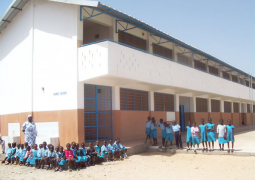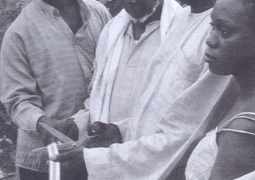Practical experiment of science is essential for better understanding of the subject, as it leads to the improvement of many aspects of national development endeavours, says the head of Maths and Science of the
Joseph Brock made these remarks recently at a workshop organised by the Project for Gambian Education and Natural Talent for twenty-five students and teachers, at the
"We had a number of teachers who are trying a new way of teaching, using practical equipment as opposed to the way they used to do it," he explained. "The idea of the practical is to show them that Science is not an obscure subject but one that has got relevance everyday of their lives.
"With better understanding of Science you have better engineers, better mechanics and every walk of life is brought on by the fact that they understand science in a better way."
Mr Brock advised teachers to put the equipment donated to their respective schools to practical use by teaching students how to use them to achieve better understanding of science.
"This is what will help the Gambian students get a better understanding of the fundamental aspects of Science, which will help them become more investigative and take it to different parts of their lives," the UK university lecturer said.
While better science education could lead to a brighter prospect for the future of the country, it cannot be actualized without investment in the schools where children learn, Mr Brock said.
"Every school has to have some level of basic equipment to start with," he advised. "We don't need very expensive equipment; we can use basic equipment with Gambian ingenuity to do practical science. Education is the future of the country. If you invest in the future of the children now the future of the country is assured, but if you don’t it won't be."
The founder of Pageant, Pippa Howard, in her remarks, said she would hope that the teachers who participated in the workshop would understand that teaching Science in a practical way would make it more understandable to their students.
"I think that science education is suffering in The Gambia, because a lot of people are not interested," she underscored. "They find it boring. Science is really exciting. I hope this workshop will increase the number of Science teachers and the quality of Science education in The Gambia and the general amount of technical knowledge as its own resource."
The
She finally stated that the college students who will soon become teachers should try to get their students involved so that they can know how to use the different science practical equipment, in the interest of better understanding.
A college student, Emily Bass, who was one of the participants, said she had learnt many things during the workshop, such as how to measure the mass, volume and density of an object, refraction of light, conduction, and electricity.
"It is amazing how much I have learnt," she testified. "This workshop has made me all the more passionate about science and I am determined to share (the knowledge gained from the workshop) with my students in the very near future."
For Nicholas Bass, another participant, the training could not have come at a better time.
He stated that they would soon be dispatched to different schools across the country on teaching practice.
"I am extremely pleased with what I have learnt in the course of the training. This is no doubt propitious preparation for us to re-ignite interest among students in our various schools."



